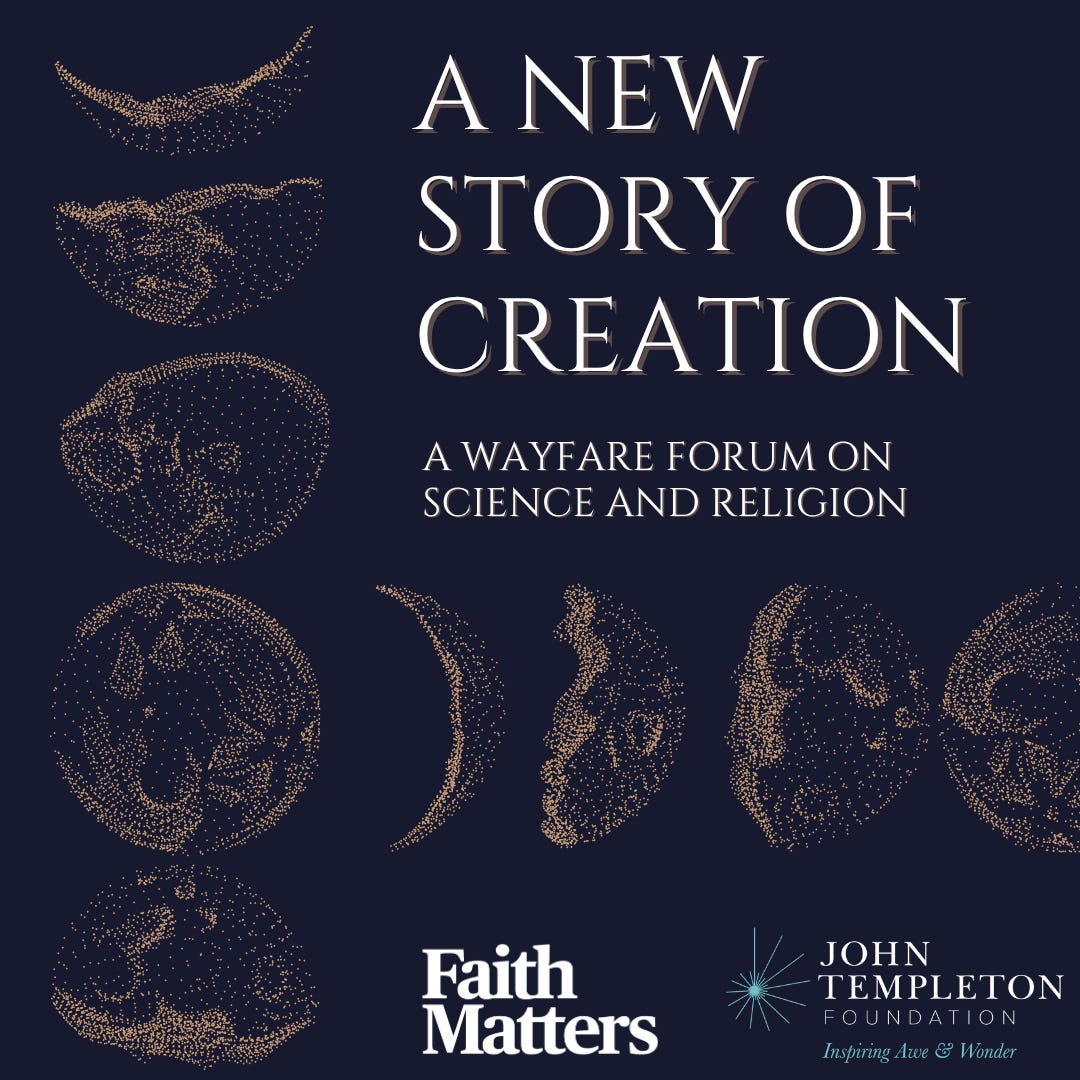A New Story of Creation
A Latter-day Science Forum
Supported by a grant from the John Templeton Foundation, Wayfare Magazine announces a call for essays and creative works exploring the themes of latter-day science and restorative modernity. We anticipate that the resulting Latter-day Science forums will support a 2026 special issue of Wayfare Magazine, published in both print and digital formats, alongside separately solicited essays, reprints of classic essays, and other creative works (art, hymns, fiction, poetry, etc.).
The forum co-editors, neuroscientist Madeline Peterson, media scholar Benjamin Peters, and intellectual historian James Ungureanu, invite you to explore the dynamic relationship between science, religion, and modernity through a Latter-day Saint lens. We seek nonfiction and fictional stories—narratives previously untold or overlooked—that the LDS tradition can reclaim and contribute to modern knowledge, enriching our collective understanding of a material, evolving, emergent cosmos and humanity's entangled place within it.
The LDS tradition, with its emphasis on continuous revelation and the pursuit of truth, offers a unique vantage point for considering the interplay between the earthly and the divine. What do the last two hundred years of science, religion, and modernity have to offer one another? How might the theo-scientific resources emerging from the entanglement of the Latter-day Saint tradition and modern science since the 1820s help address fundamental questions? What other pressing questions might need addressing? (Find a list of over 500 keywords to spark thought at the bottom of this post.)
EDITORIAL GUIDELINES
While the forum coeditors welcome all inquiries and conceive of science in the broadest sense of the German Wissenschaften (including the humanities, social sciences, and the professions), we are not seeking Sunday School solutions or autodidactic pet theories. (For example, a successful take on Kolob should primarily rethink this world before any other.) We aim to advance thoughtful narratives, close readings, novel theorizations, renewed inquiries, and other creative works that broaden understanding of the human condition in a working cosmos.
KEY QUESTIONS FOR EXPLORATION
The coeditors welcome contributions exploring a range of topics, including but not limited to:
Core questions such as, How does heaven know earth? How does earth know heaven? (How might older senses of knowing reshape parental visions of heaven and earth?) What is Latter-day Saint science, what is latter-day science, and how would one know? What are the necessary, sufficient, or graceful relationships between modern science and latter-day religion?
Latter-day learning: How might LDS theological practice and understanding, rooted in Joseph Smith's vision of a progressing divine partnership, illuminate the broader dialogue between science and religion in human understanding? What philosophical, methodological, and storytelling stakes arise in conceiving of a common progressing, embodied, and pluralist universe? Is there something, say, curiously pre-postmodern about both empiricist science and materialist LDS theology?
Stories in the 5Es frames: What stories about what this forum is calling the five Es—emergence, evolution, embodiment, entanglement, and entropy—would help clarify a latter-day relationship between revelation and knowledge? What, if anything, can, or must be, seen from within these traditions? What, if anything, can, or must be, seen from without?
THE FIVE Es FRAMEWORK
What is at stake in entropy, emergence, embodiment, evolution, and entanglement in the latter days? How might our forum’s cosmological 5Es interact with the cognitive 4Es (embodied, embedded, enacted, and extended)?
How does this framework relate to systems thinking, environmental action, transhistorical and transhumanist possibilities?
How do latter-day developments in any number of contemporary fields—anthropocosmology, bioastrology, complexity studies, divinity, evolution, fantasy and (science) fiction (just to start the alphabet)—interact with the 5E framework or otherwise reveal truths about the present world order? How do developments in genome, gravity, the internet, modern medicine, multiverse theory, nuclear energy, ocean and space exploration, string theory, or other areas inform that view?
How do questions about faith-lit science illuminate developments in technology, media, storytelling, the environment, and current uneven relations of information, knowledge, and power?
THE PROBLEM OF KNOWLEDGE AND COMPLEXITY
How do these relationships balance the complexity of the cosmos with the parsimony of understanding?
How do reductionism and complexity reconcile, if at all? When do theory, revelation, and evidence sit in useful tension with one another?
How might various sources of truth—discernment, experiment, (science) fiction, theory, tradition, scripture, and others—inform a faithful worldview that remains underdetermined by evidence?
Under what conditions do collective epistemic humility and fearless inquiry grow together?
SCHOLARLY METHODS AND SPIRITUAL TRUTH-SEEKING
What are the methods, philosophies, and underlying theologies behind religious and scientific truth-seeking?
How might critical reflection, hypothesis testing, and inspired reading serve as different names for the toolkit used to construct and reclaim truth in Zion?
How might spiritual "blinding"—the introduction of deliberate unknowns and experimental discipline—serve a culture rich with epistemic uncertainties?
Whence the religious energies in worldbuilding, science fiction, and fantasy?
How might latter-day scholarship serve as worship and calculated kingdom-building?
How might latter-day worship invite the awe, discipline, meaning-making, reverence, and speculation that informs scholarly inquiry?
HISTORICAL AND CONTEMPORARY THINKERS
How might insights from thinkers such as Thomas Bayes (pastor of probability), Emanuel Swedenborg (anatomy and natural philosophy), Joseph Smith (School of Prophets), Susa Young Gates (women’s rights), Pierre Teilhard de Chardin (Jesuit paleontologist), B. H. Roberts (progressive education), John A. Widtsoe (rational theology), Martha Hughes Cannon (public health), Lillian Moller Gilbreth (organizational psychology), Henry Eyring (chemistry), Karl Popper (falsifiability), Hannah Arendt (public), Thomas Kuhn (paradigm shift), Mary Hesse (analogy), Rosemary Radford Ruether (ecotheology), Paul Feyerabend (skepticism), E. Robert Paul (LDS cosmology), Bruno Latour (catholic epistemologies), Brandon Sanderson (worldbuilding and context), among many others, prove relevant today?
TIMELINE AND SUBMISSION PROCESS
We invite scholars, artists, and thinkers to contribute to this vital conversation at the intersection of faith, science, and human understanding. Contributions may be in any genre of creative work, although story-driven nonfiction essays of 1,000-2,000 words are especially welcomed. Longer pieces may also be solicited in conversation with the forum co-editors.
Click below to submit an essay and select the category “Latter-day Science Forum.”
Deadline for submissions is November 1, 2025. For questions, write us at wayfareeditor@gmail.com.





